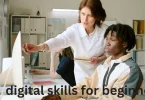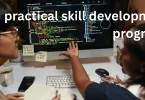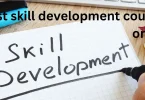Let’s be real for a second—trying to “build professional skills” can sound like one of those corporate buzzwords that people throw around in meetings. But when you’re just starting out or trying to grow in your career, it can feel confusing and even overwhelming. You might think, “Where do I even start? What skills do I really need? And how do I get better without spending years learning everything?” We’ve all been there. Whether you’re a student stepping into your first internship, a fresh graduate trying to figure out what comes next, or a young professional hoping to level up your career game, learning professional skills isn’t just about adding shiny new qualifications to your résumé—it’s about becoming confident, adaptable, and ready for anything work life throws at you. That’s where professional skill building tips come in. They aren’t just random pieces of advice—they’re your guide to unlocking your potential and transforming it into consistent, practical success.
Why Professional Skills Matter More Than Ever
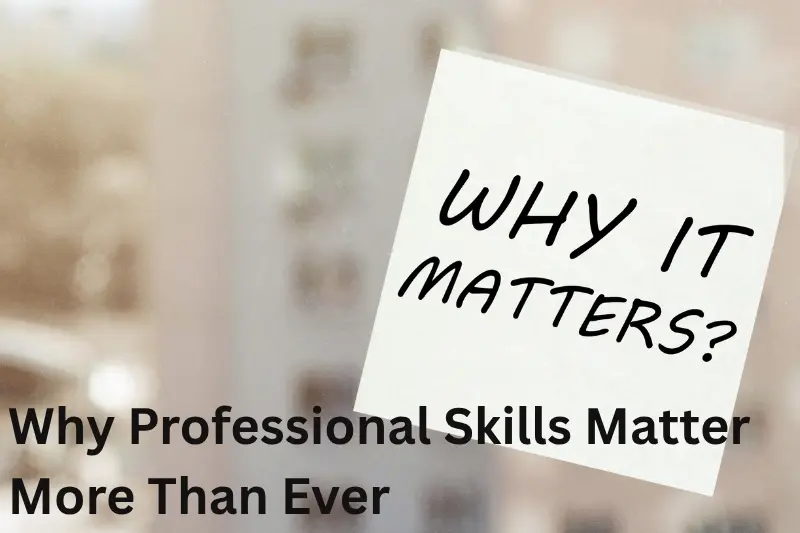
Here’s the deal: technical skills might help you land a job, but professional skills help you keep it, grow in it, and enjoy it. Think about it—you could be an excellent coder, designer, teacher, or analyst, but if you can’t express your ideas clearly, handle pressure, or work well with others, your talent might get lost in translation. Professional skills—like communication, teamwork, problem-solving, adaptability, and leadership—are the unsung heroes of every successful career. Employers today aren’t just looking for people who can “do the work”; they’re looking for people who can think critically, collaborate effectively, and lead confidently. These skills show that you’re not just capable but dependable, flexible, and ready for challenges. The workplace has evolved fast, and the ability to adapt, learn, and communicate is now more valuable than ever. When you focus on professional skills, you’re not only future-proofing your career—you’re shaping yourself into the kind of professional others trust and respect.
Getting Started: How to Build a Strong Skill Foundation
Let’s start simple. Building professional skills doesn’t happen overnight. It’s not about reading one book or watching one video—it’s about small, consistent habits that slowly transform how you work and think. The first step is self-awareness. Take some time to reflect on your strengths and weaknesses. Maybe you’re great at managing deadlines but struggle with public speaking. Maybe you’re confident in writing but hesitate in teamwork. Knowing where you stand gives you clarity. Next, set small, achievable goals. Don’t aim to master everything at once. Instead, focus on one or two areas at a time—like improving your time management this month, or practicing active listening at work. Start applying what you learn daily. For example, if you’re working on communication, volunteer to lead a meeting or share updates with your team. The more you practice, the more natural it becomes. Growth doesn’t require perfection—it requires persistence. Every effort, no matter how small, counts toward building a stronger professional version of yourself.
Communication: The Heart of Every Professional Relationship
Let’s talk communication, because it’s easily one of the most misunderstood yet essential skills in any profession. It’s not about talking more—it’s about connecting better. Good communication means expressing your ideas clearly, listening actively, and being mindful of how others perceive your words. Poor communication leads to misunderstandings, missed opportunities, and unnecessary conflicts. To strengthen your communication skills, start with the basics—listen to understand, not just to respond. Be clear and concise when you speak or write. Avoid complicated jargon when simple words will do. Ask questions if something isn’t clear, and always confirm understanding when giving or receiving instructions. Pay attention to your tone and body language—they often say more than words. Communication is a skill that improves with practice, so the more you engage in conversations, presentations, and discussions, the more confident you’ll become. Remember, effective communicators don’t just get heard—they make an impact.
You may also like to read these articles
Unlock the Best Study Resources for School Students Today
Free Educational PDF Downloads for Smarter Learning and Study Success
Master Success with Study Guides for Competitive Exams
Online Notes and Tutorials 2025: Unlock Smarter Learning Anytime, Anywhere
Empower Your Learning with the Best Websites for Study Resources
Time Management: Working Smarter, Not Harder
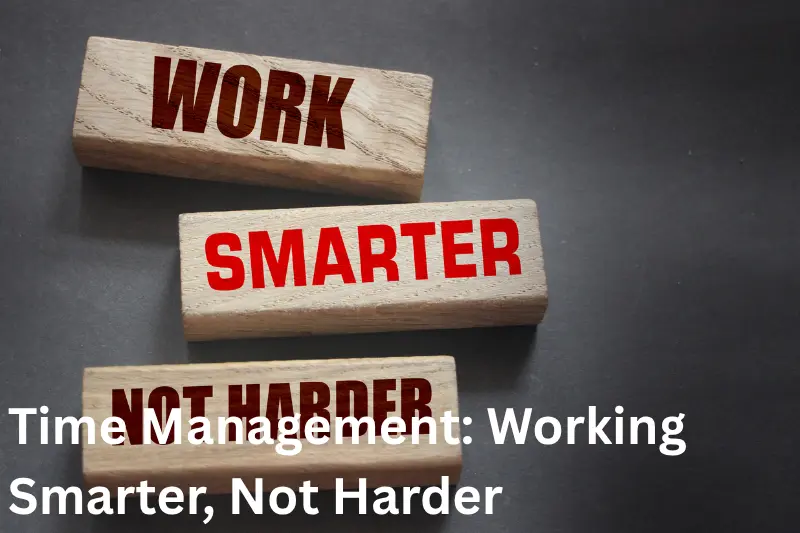
We’ve all had those days when the clock seems to be moving faster than we are. Time management isn’t about doing everything—it’s about doing what truly matters. Many people waste time multitasking, but in reality, multitasking often reduces efficiency. Focus on one task at a time. Start your day with a plan—list your top three priorities, not ten. Break large projects into smaller, manageable chunks so you don’t get overwhelmed. Tools like planners, digital calendars, or time-blocking apps can help you stay on track. Also, learn to say no when needed. Taking on too much might seem impressive at first, but it often leads to burnout. Protect your focus and energy for what truly matters. And here’s something often overlooked—make time for rest. Productivity thrives on balance. When you manage your time well, you reduce stress, boost performance, and create space for personal growth too.
Adaptability: Thriving in a Changing World
If there’s one thing the modern workplace guarantees, it’s change. New technologies, new systems, and unexpected challenges are always around the corner. The key to surviving—and thriving—is adaptability. Being adaptable means embracing change with curiosity instead of fear. It’s about staying flexible when plans shift and learning quickly when situations demand it. People who adapt easily are problem-solvers by nature. They don’t freeze when things go wrong—they figure it out. To become more adaptable, get comfortable stepping out of your comfort zone. Try new tools, explore different perspectives, and be willing to unlearn old habits that no longer serve you. Remember, adaptability isn’t about changing who you are—it’s about growing with your circumstances. When you’re adaptable, challenges become opportunities, and uncertainty becomes a chance to prove your resilience.
Emotional Intelligence: The Secret Ingredient
Emotional intelligence—or EQ—is what separates good professionals from great ones. It’s not about being overly emotional; it’s about understanding and managing emotions—both yours and others’. High EQ helps you handle pressure, resolve conflicts, and build stronger relationships. To develop emotional intelligence, start with self-awareness. Notice how you react under stress or criticism. Practice empathy by trying to understand others’ perspectives before responding. Keep your cool in tough situations and communicate calmly even when emotions run high. Emotional intelligence also means being humble enough to accept feedback without defensiveness. The more emotionally aware you become, the better you handle people and situations. It’s a skill that silently enhances every other professional ability you have.
Problem-Solving: Turning Challenges into Opportunities
Let’s face it—problems are part of every job. But the real question is: how do you approach them? Problem-solving isn’t about having all the answers; it’s about finding them. A good problem-solver stays calm, analyzes the situation, and explores multiple options before making a move. When a challenge appears, define it clearly. Gather all the facts and avoid jumping to conclusions. Brainstorm ideas—even the wild ones. Sometimes, the most creative solutions come from unexpected thinking. Don’t be afraid to ask for input—collaboration often leads to better results. The goal isn’t just to fix the problem but to learn from it, so you’re even better prepared next time. Each challenge you overcome adds to your confidence and experience.
Teamwork: Building Bridges, Not Walls
No one succeeds alone. Teamwork is at the heart of every thriving organization. But working with others isn’t always easy—different personalities, opinions, and work habits can cause friction. That’s where strong teamwork skills come in. Being a great team player means listening actively, communicating clearly, and respecting everyone’s contributions. Share credit for successes and take responsibility when things go wrong. Don’t hesitate to offer help or guidance when needed, and be open to learning from others. Remember, teamwork isn’t about blending in—it’s about contributing your strengths while valuing those of others. When you collaborate effectively, you build trust, boost creativity, and achieve goals faster.
Leadership: More Than Just Managing
Leadership is often misunderstood as something only for managers or executives. But true leadership starts with self-leadership. It’s about taking initiative, setting examples, and inspiring others—no title required. A good leader listens, supports, and motivates others to bring out their best. Leadership also means being accountable and making tough decisions with fairness and empathy. You can start developing leadership skills by volunteering to lead a project, mentoring a junior colleague, or simply offering ideas to improve processes. Great leaders don’t command—they guide. They don’t seek power—they seek purpose. And the best part? Leadership grows naturally from confidence, communication, and consistency.
Networking: Connecting with Purpose
Networking gets a bad reputation for being fake or forced, but real networking is just relationship-building with purpose. It’s about connecting with people who inspire, challenge, and support you. Start by being genuinely curious about others—what they do, what they value, and how you can add value in return. Attend industry events, join online forums, or simply reach out to professionals on platforms like LinkedIn. Networking isn’t about quantity—it’s about quality. A handful of genuine connections can be more powerful than hundreds of casual acquaintances. When you nurture these relationships, they often lead to opportunities, collaborations, and friendships that shape your career path.
Lifelong Learning: Staying Ahead of the Curve
In today’s world, learning never stops. Technology changes fast, industries evolve, and what’s relevant today might not be tomorrow. That’s why lifelong learning is key to career growth. Keep your curiosity alive. Read articles, take online courses, join webinars, or explore tutorials. Learning doesn’t have to be formal—it can happen in conversations, podcasts, or even mistakes. The more you learn, the more adaptable and confident you become. Treat learning as part of your routine, not a one-time task. Continuous learning is what keeps you sharp, motivated, and ready for whatever comes next.
Confidence: The Skill That Amplifies All Others
Confidence ties all your skills together. It’s the quiet belief that you’re capable and prepared. Confidence doesn’t mean you never doubt yourself—it means you take action despite those doubts. To build confidence, start by setting small goals and celebrating when you achieve them. Speak up in meetings, share your opinions, and volunteer for challenges that stretch you. Confidence grows through repetition and success, not perfection. The more you step up, the more your inner voice shifts from “I can’t” to “I got this.” And when you radiate confidence, people notice—it makes you memorable, trustworthy, and inspiring.
Balancing Soft and Hard Skills
Think of hard and soft skills as two sides of the same coin. Hard skills are your technical expertise—the things you can measure and prove. Soft skills are the human side—communication, empathy, adaptability. Both are essential. A great engineer who can’t collaborate effectively or a talented writer who struggles with deadlines may face roadblocks. Strive for balance. For every new technical skill you learn, pair it with a complementary soft skill. For instance, if you’re learning data analysis, work on your storytelling ability to present insights clearly. This balance makes you not just skilled—but complete.
Overcoming Common Skill-Building Challenges
Skill-building sounds exciting until life gets busy or motivation fades. Maybe you start strong but lose track after a few weeks. That’s okay—it happens to everyone. The secret is to stay consistent, not perfect. Set a simple routine—maybe 20 minutes a day to practice or reflect. Find accountability by joining a learning group or sharing your progress with a friend. When setbacks happen, don’t quit—adjust your approach. Every small effort counts. Remember, growth is messy before it’s magical. What matters is that you keep moving forward.
Turning Skills into Habits
A skill becomes powerful when it becomes a habit. Practice your new skills daily until they blend into your routine. If you’re learning time management, start by planning your next day every evening. If you’re working on communication, consciously listen more during conversations. The goal isn’t to do something once—it’s to make it automatic. Habits compound over time, turning your efforts into lasting change.
Real-World Application: Putting Skills to Work
Don’t just learn—apply. Take every opportunity to use your new skills in real life. Volunteer for tasks outside your comfort zone. Join group projects, lead meetings, or offer to help on initiatives that challenge you. Application cements learning. The more you apply what you learn, the faster it becomes part of who you are. Every project, challenge, or mistake becomes a stepping stone toward mastery.
The Power of Self-Reflection
Growth without reflection can feel aimless. Every few months, pause and assess your progress. Ask yourself what’s improved, what still feels challenging, and what lessons you’ve learned. Reflection turns experiences into wisdom. Write down your observations—it helps you see how far you’ve come. Self-awareness isn’t just about improvement—it’s about appreciating your journey.
Staying Motivated Through the Process
Motivation will fade—it always does. What keeps you going is discipline and purpose. Remember why you started. Maybe you want a promotion, a career shift, or simply to become more confident. Visualize that goal when you feel stuck. Reward yourself for progress, no matter how small. Stay inspired by learning from people who’ve achieved what you aim for. Surround yourself with positive, driven individuals—they’ll help keep your spark alive.
The Ultimate Takeaway: Grow at Your Own Pace
There’s no race in skill development. The only person you’re competing with is the version of yourself from yesterday. Some days you’ll make big leaps; other days, you’ll just take small steps. Both count. Growth is about consistency, not speed. Keep going, keep learning, and remember—every bit of effort you put in today builds a stronger tomorrow.
Conclusion: You’ve Got This
Building your professional skill set is one of the most rewarding journeys you’ll ever take. It’s not about being perfect—it’s about staying committed to growth, no matter how slow it feels. Each skill you develop makes you more capable, confident, and ready for whatever comes next. Be proud of every step, because progress—no matter how small—is still progress. Keep learning, keep growing, and most importantly, believe in yourself. The effort you’re putting in today will shape the professional you become tomorrow.
Quick Takeaway Checklist
- Identify your top strengths and weaknesses.
- Focus on one skill at a time.
- Apply what you learn daily.
- Reflect regularly on your progress.
- Stay consistent and celebrate small wins.
FAQs
What are professional skill building tips?
They’re practical strategies that help you develop essential workplace skills like communication, teamwork, leadership, and problem-solving to grow your career.
Why are professional skills important?
Professional skills improve how you work, communicate, and manage tasks, helping you stand out and progress faster in your job or business.
How can I improve my professional skills?
You can improve them through online courses, mentorship, consistent practice, feedback, and real-world experience in your field.
Which professional skills are most valuable today?
Skills like adaptability, communication, emotional intelligence, leadership, and digital literacy are highly valued in today’s workplaces.
How do professional skill building tips help in career growth?
They guide you to refine your strengths, overcome weaknesses, and develop habits that make you more confident, efficient, and career-ready.






